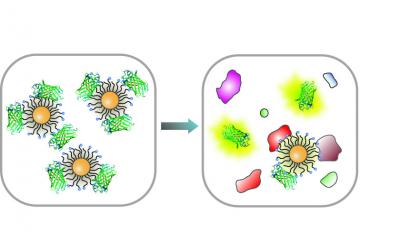A research team headed by Vincent Rotello from the University of Massachusetts Amherst (UMass Amherst) has developed a nose-like sensor array system made of gold nanoparticles and proteins to detect a variety of cancer types in live tissues.

Gold
nanoparticles (at left) with green fluorescent protein (GFP) 'smell' different cancer types in much the same way our noses identify and remember different odors. At right, the distinct protein levels in a cancer interact with the particle to generate patterns used to identify cancer type. (credit: UMass Amherst)
The UMass Amherst chemists tested their sensor array system in a pre-clinical non-small-cell lung cancer metastasis mouse model devised by Frank Jirik and collaborators at the University of Calgary. The new system is built upon a ‘chemical nose’ array system of nanoparticles and polymers developed by Rotello and colleagues. This chemical nose array is capable of differentiating between cancer cells and healthy cells.
The new sensor array system is capable of detecting minuscule levels of various types of metastatic cells in live tissues and organs rapidly and effectively. This advancement is a significant step towards the realization of a general diagnostic test, said Rotello. The study results have been published in the ACS Nano journal.
The UMass Amherst team’s innovative approach involves the use of a gold nanoparticle sensor array and a green fluorescent protein (GFP) that gets activated in response to protein patterns present in tumor cells within few minutes, thus rapidly allocating a specific signature to each type of cancer.
For this study, the chemists taught the nanoparticle-GFP sensor array to identify the mouse tumor and healthy tissue samples selected by them and the GFP to fluoresce when metastatic tissues are present. The system differentiated metastases from healthy tissues within minutes, thus offering a faster detection technique to identify cancer and other illnesses utilizing minimally invasive microbiopsies.
According to the researchers, their sensor demonstrates high sensitivity and can differentiate between high (ovary, adrenal, bone) and low (parental) metastases, and between site-specific cells like prostate, lung, liver and breast cancers. The researchers’ next move is to test their new sensor array system in human tissue samples.
Disclaimer: The views expressed here are those of the author expressed in their private capacity and do not necessarily represent the views of AZoM.com Limited T/A AZoNetwork the owner and operator of this website. This disclaimer forms part of the Terms and conditions of use of this website.